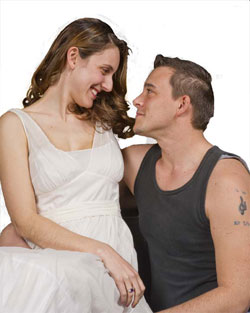Remember how not too long ago, people were celebrating the United States’ entrance into a “post-racial” era? Anyone who believed that then has probably had their buzz harshed more than a few times since, most recently by the state of Arizona and Rand Paul, which is to say that racial ignorance, prejudice, and insecurity still have the capacity to wreak needless dumb tragedy in this country.

STAR-CROSSED LOVERS Kristin Riley and Jason Hair-Wynn as Maria and Tony.
|
And so the quintessential dumb American tragedy related in West Side Story hasn’t yet become pure period piece. Its sad outrages are poignant in Portland Players’ production, directed and choreographed by Michael Donovan with music direction by Rebecca Michals Rinaldi.As the leaders of the two gangs contending for turf, Riff and Bernardo (David Aaron Van Duyne and Brandon Pullen), square off in interesting contrast. Van Duyne puts on great swagger and loose-limbed, clownish bravado for his head Jet, while svelte Pullen’s Bernardo is more reserved as the top Shark, disdaining, almost reluctant — at least until his temper flares.
Flare he does when he sees his sister Maria (Kristin Riley, beautifully) entwined with the sweet, square Jet Tony (Jason Hair-Wynn, in a sweater-vest and with great youthful charm). The new lovers find and fall for each other in a scene that Riley and Hair-Wynn play gracefully, and what could easily become maudlin after all these years feels fresh, full of the intoxicating cosmic mystery that imbues young love.
As tensions rise among and between the lovers’ friends, spurred on by lawmen Schrank and Krupke (Mark Barrasso and Joe Swenson), the gangs range over Steven Lupien’s simple industrial set of chain link, which the guys frequently scale, and the drab hues of concrete and brick. An intricate light plot by Matt Brann often shifts very quickly between spots and character, an effective means of heightening the lightning tension of the gangs’ discord.
Rinaldi’s six-person pit orchestra, directed up stage left, gives an impressive performance of Bernstein’s difficult, dissonant compositions, and singers too have been well directed and perform well. Riley’s and Hair-Wynn’s voices are particularly strong, and Hair-Wynn especially holds his own against the complicated time changes and harmonies. This large cast also boasts lots of good dancers; watch especially for Van Duyne and the excellent Cory Bucknam, as Riff and his girl Graziella shake it up at the dance. Melissa Morad’s Anita, Maria’s best friend, has some super moves too, and plenty of attitude.
As for the boys, the gang members in this show are often portrayed with more pathos than menace: The mix of duds is as much preppie as hoodlum, the kids are frequently funny and unsure of themselves, and their posturing among each other suggests real violence only in particularly heightened moments. Though certain scenes and numbers could use some more kinetic tension (particularly “Cool,” a pre-rumble number in which the Riff tries to get the Jets to simmer down and wait), the net effect is that these guys do seem basically like good kids, just young, bored, and easily provoked by social cues, rather than harboring latent urges to violence.